
In this new series for 2021, I’m looking at Tudor events a week at a time. This talk covers events from the Tudor period which took place on January 4th, 5th, 6th, 7th, 8th, 9th and 10th.
[Read More...]
In this new series for 2021, I’m looking at Tudor events a week at a time. This talk covers events from the Tudor period which took place on January 4th, 5th, 6th, 7th, 8th, 9th and 10th.
[Read More...]
On this day in history, 24th December 1604, Christmas Eve, Sir Thomas Cornwallis, Comptroller of the household of Mary I and member of Parliament, died at about the age of eighty-six.
Cornwallis had been active putting down rebellion in 1549 and during the succession crisis of July 1553 swapped sides at just the right time, recanting his proclamation for Jane as queen and proclaiming for Mary instead, He was rewarded for this when Mary came to the throne.
Of course, he wasn’t so much a favourite in the reign of Elizabeth I, but a friendship with a man close to Elizabeth may have helped him escape trouble.
Find out more about Sir Thomas Cornwallis in today’s talk.
[Read More...]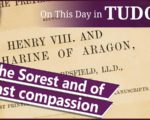
On this day in Tudor history, 18th December 1575,in the reign of Queen Elizabeth I, fifty-six-year-old historian, Catholic apologist, priest and former Archdeacon of Canterbury, Nicholas Harpsfield, died in London.
Harpsfield and his brother, John, had been imprisoned since the early 1560s for refusing to swear the Oath of Supremacy, but had been released in 1574 on the grounds of ill-health.
In Mary I’s reign, he had been involved in the persecutions of Protestants, and martyrologist John Foxe described him as “the sorest and of leaste compassion” of all the archdeacons involved.
Find out more about his life, career and rise, his works, and his end, in today’s talk.
[Read More...]
On this day in Tudor history, 16th (or possibly the 18th) December 1503, George Grey, 2nd Earl of Kent, died at Ampthill, Bedfordshire.
Grey served as a soldier under Henry VII, was on the king’s council, and served him as Constable of Northampton Castle and as a judge at the trial of Edward, Earl of Warwick in 1499.
He was also married to a sister of Elizabeth Woodville.
Grey also managed to retain royal favour on Henry VII’s accession even though he’d been rewarded by Richard III.
Find out more about George Grey in today’s talk.
[Read More...]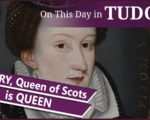
On this day in Tudor history, 14th December 1542, six-day-old Mary, daughter of King James V and his second wife, Marie de Guise, became Queen of Scotland – Mary, Queen of Scots.
King James V, who had ruled since 1513, was just 30 at his death.
Find out what happened to James V, and how Mary became queen at such a young age, in today’s talk.
[Read More...]
On this day in Tudor history, 13th December 1558, civil lawyer and dean of Chester William Clyffe died.
Clyffe was one of the authors of the 1537 “Bishops’ Book”, and he was consulted by convocation during Henry VIII’s Great Matter. He was thrown into prison for a time for refusing to do a favour for one of the king’s servants – oh dear!
Find out more about William Clyffe’s life and career in today’s “on this day” talk.
[Read More...]
On this day in Tudor history, 8th December 1538, courtier and Master of the Horse to Queens Anne Boleyn and Jane Seymour, Sir William Coffin, died at Standon in Hertfordshire.
It is thought that he died of the plague because his wife Margaret wrote to Thomas Cromwell saying that Coffin had “died of the great sickness, full of God’s marks all over his body”.
Who was Sir William Coffin and what did the Master of the Horse do?
Find out in today’s talk.
[Read More...]
On this day in Tudor history, 30th November 1601, sixty-eight-year-old Queen Elizabeth I delivered her famous Golden Speech to the House of Commons.
In this final speech to Parliament, Elizabeth spoke of her position as Queen and her love and respect for her realm, her people, and for her members of Parliament. It was a speech that brought many of those listening to tears. It was obviously a very heartfelt speech by a queen who truly loved her people.
In today’s talk, I share Elizabeth I’s Golden Speech, along with some beautiful portraits of the queen.
[Read More...]
On this day in Tudor history, 25th November 1545, lawyer, member of Parliament, diplomat and ecclesiastical administrator, Sir Thomas Legh (Leigh), died.
Legh was a faithful servant to King Henry VIII, but his work during the dissolution of the monasteries led to complaints against him and even rebellion.
He was a vicious man, known for his harsh treatment of monks, but he also played a key role in protecting Thomas Cranmer, Archbishop of Canterbury, in 1543 when his enemies tried to bring him down.
Let me give you a few facts about this Tudor man, Sir Thomas Legh…
[Read More...]
On this day in Tudor history, 18th November 1559, Ralph Baynes (Baines), Bishop of Coventry and Lichfield, died.
Baynes had been actively involved in the persecutions of Protestants in Mary I’s reign, examining many well-known martyrs and featuring in John Foxe’s “Book of Martyrs”, but ended his days imprisoned in the home of Edmund Grindal, Bishop of London – why?
Find out more about Ralph Baynes, his life and career, and how he came to be deprived of his bishopric and die the way he did, in today’s talk.
[Read More...]
On this day in Tudor history, 15th November 1527, a woman who called herself ““the excellent Princess Katherine, Countess of Devon, daughter, sister and aunt of kings”, died at Tiverton Castle in Devon.
Katherine of York, Countess of Devon, daughter of King Edward IV and Elizabeth Woodville, was just forty-nine when she died and had taken a vow of chastity after her husband’s death.
In today’s talk, I give an overview of Henry VIII’s aunt’s life and explain why she took her vow of chastity. Find out all about her.
[Read More...]
On this day in Tudor history, 14th November 1541, an inventory was taken of “the goods and chattels, lands and fees of” Thomas Culpeper, a groom of King Henry VIII’s privy chamber and a man who had been having secret meetings with Catherine Howard, Henry VIII’s fifth wife.
An inventory had also been taken of the possessions of Jane Boleyn, Lady Rochford, wife of the late George Boleyn, a woman who had allegedly helped the queen meet with Culpeper.
But what was going on in November 1541 and what was listed in these inventories?
[Read More...]
On this day in Tudor history, 12th November 1555, Mary I’s Lord Chancellor, Stephen Gardiner, Bishop of Winchester, died. He was laid to rest at Winchester Cathedral in what is now known as the Bishop Gardiner Chantry Chapel.
In today’s talk, I tell you about the life and career of “Wily Winchester”, a man who went from being a valued advisor to being imprisoned, and then got back into favour, crowned a queen and became Lord Chancellor! He led quite a life!
[Read More...]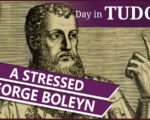
On this day in Tudor history, 11th November 1534, Philippe de Chabot, Seigneur De Brion and Admiral of France, landed on English soil. The purpose of the diplomatic mission he was leading was to renew Anglo-French relations.
George Boleyn, Lord Rochford, brother of Queen Anne Boleyn, had been put in charge of meeting the admiral and escorting him on his journey from the south coast to London, but it was no easy task. The admiral did not make things easy at all, and George was rather stressed about the situation.
Find out what happened, and how and why the ambassador’s visit was bad news all round for the Boleyns, in today’s talk.
[Read More...]
This day in Tudor history, 9th November 1569, is the traditional date given for the start of the only major armed rebellion of Elizabeth I’s reign. It’s known as The Northern Rebellion or Rising of the North or Revolt of the Northern Earls.
Northern earls Charles Neville, 6th Earl of Westmorland and Thomas Percy, 7th Earl of Northumberland, led this uprising against Elizabeth I, seeking to depose her, replace her with Mary, Queen of Scots, and restore Catholicism.
But what happened?
Find out about the 1569 Northern Rebellion and the fate of the Northern Earls in today’s talk.
[Read More...]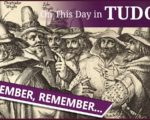
Today is the anniversary of the discovery of Gunpowder Plot conspirator, Guy Fawkes, and 36 barrels of gunpowder in a cellar beneath the Palace of Westminster on the night of 4th/5th November 1605. The plotters were planning to blow up the Houses of Parliament on the opening of Parliament and assassinate the king, his government and leading bishops and nobles.
But why and what has this event in James I’s reign got to do with Tudor history?
Well, a lot, because the Gunpowder Plot had its roots in Elizabeth I’s reign.
Find out more about the Gunpowder Plot, and those involved, in today’s talk.
[Read More...]
On this day in Tudor history, 29th October 1532, King Henry VIII bid farewell to his “loving brother”, his French counterpart, King Francis I.
The two kings had enjoyed each other’s company at Calais and Boulogne, and Henry VIII was pleased with their meetings. In fact, things had gone so well that Henry VIII decided to marry Anne Boleyn!
Find out more about their farewell, and what had happened during the trip, in today’s talk.
[Read More...]
On this day in history, 19th October 1469, an event took place in Spain that was not only important in Spanish history, but which had an impact on Europe and which has links with the Tudors.
The event was the marriage of an eighteen-year-old woman called Isabella and a seventeen-year-old man called Ferdinand. They’d become the famous Reyes Catolicos, the Catholic monarchs, Isabella I of Castile and Ferdinand II of Aragon, and would bring together two powerful kingdoms, which comprised most of what is modern-day Spain.
In today’s talk, I tell you more about this powerful couple, their reigns and their legacy.
[Read More...]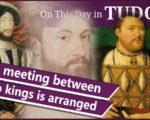
On this day in Tudor history, 16th October 1532, while Henry VIII and Anne Boleyn, Marquess of Pembroke, were on their visit to Calais, English nobles met French nobles to arrange a meeting between the King of England and his French counterpart, King Francis I.
In today’s talk, I give details on this event, who was there, what happened, and why Henry VIII and Anne Boleyn had gone to Calais.
[Read More...]
On this day in Tudor history, 11th October 1532, King Henry VIII and Anne Boleyn, the newly created Marquess of Pembroke, set sail from Dover aboard the king’s ship, The Swallow.
They were off to Calais on a mission involving the Great Matter, Henry VIII’s quest for an annulment. But why? What would they do there? Who would they meet?
Find out more about this trip, what happened and what happened next, in today’s talk.
[Read More...]
On this day in Tudor history, 10th October 1588, Robert Dudley, Earl of Leicester, was buried in the Beauchamp Chapel of the Collegiate Church of St Mary, Warwick, according to his instructions.
His funeral was well-attended and his widow, Lettice, a woman known by Elizabeth I as “the she-wolf”, erected a monument to “her best and dearest husband” in the chapel, which was also the resting place of the couple’s young son, Robert, “the noble impe”.
Find out more about Leicester’s funeral and resting place, and see some photos of his tomb, in today’s talk.
[Read More...]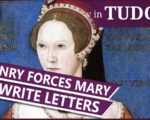
On this day in Tudor history, 8th October 1536, while the Pilgrimage of Grace rebellion was getting underway in Lincolnshire and spreading to Yorkshire, Henry VIII wasn’t only issuing orders regarding the rebels, he was also issuing orders regarding his eldest daughter.
Henry and Mary had recently reconciled after Mary had finally submitted to him and recognised his supremacy and her illegitimate status. It was something that cost Mary dearly, but it did mend her relationship with her father and allow her back at court.
But then Henry VIII put more pressure on his daughter by forcing her to write to the pope and to Mary of Hungary, the emperor’s sister.
What did Mary have to write? What did the king want of his daughter? And why had Mary submitted to her father?
Find out all about this in today’s talk.
[Read More...]
On this day in Tudor history, 5th October 1549, Edward Seymour, Duke of Somerset and Lord Protector, ordered a gathering of men at Hampton Court Palace, where he was lodged with the young King Edward VI, due to tensions mounting between Somerset and John Dudley, Earl of Warwick.
What was going on and what happened when 4,000 peasants turned up? How did John Dudley react and what did King Edward VI have to say about it all?
Find out what happened, and how this led to Somerset’s undoing, in today’s talk.
[Read More...]
On this day in Tudor history, 2nd October 1514, eighteen-year-old Mary Tudor, sister of King Henry VIII, set off from Dover to sail to France to marry fifty-two-year-old King Louis XII of France.
Things hadn’t gone to plan with the scheduled sailing, due to bad weather, and Mary encountered rough seas on her journey too.
Find out about the arrangements for the journey, who was at Dover, Mary’s crossing to Boulogne, and what happened next, in today’s talk.
[Read More...]
On this day in Tudor history, 28th September 1599, Elizabeth I’s favourite, Robert Devereux, 2nd Earl of Essex, strode into the queen’s bedchamber unannounced and saw her without her makeup or wig, without her “mask of youth”.
Why would he do such a thing?
Find out why Devereux was troubled and wanted to see the queen urgently and how Elizabeth I reacted to his visit, and what happened next, in today’s talk.
[Read More...]
On this day in history, 27th September 1442, in the reign of King Henry VI, John de la Pole, 2nd Duke of Suffolk, was born.
He may have been born in the Plantagenet period, but Suffolk’s first wife was Lady Margaret Beaufort, the future mother of Henry VII. Suffolk went on to serve Henry VII loyally, although his son was involved in the Lambert Simnel Rebellion
Find out more about John de la Pole, 2nd Duke of Suffolk, his life and career, and what happened with his marriage to Lady Margaret Beaufort, in today’s talk.
[Read More...]
On this day in Tudor history, 21st September 1557, Henry Pendleton, theologian, chaplain and friend of Bishop Bonner, was buried at St Stephen’s, Walbrook, London.
Pendleton is known not only for his strong preaching, which led to him being shot at once, but also for his changing religious faith. He went from staunch Catholic to zealous Protestant to staunch Catholic, even taking part in disputations with his former friends and seeing them imprisoned and burnt.
Find out more about Henry Pendleton, his life, career and changing religious beliefs, in today’s talk.
[Read More...]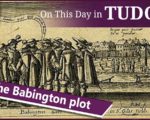
On this day in Tudor history, 20th September 1586, Anthony Babington, John Ballard, John Savage, Chidiock Tichborne and three other conspirators were executed near St Giles-in-the-Fields in London.
They suffered full traitors’ deaths, being hanged, drawn and quartered, after being found guilty of treason for plotting to assassinate Queen Elizabeth I in the famous Babington Plot, which sought to replace Elizabeth with Mary, Queen of Scots.
Find out more about Anthony Babington, the Babington Plot, the men involved, how it was discovered, and how it led to Mary, Queen of Scots’ execution, in today’s talk.
[Read More...]
On this day in Tudor history, 18th September 1556, Edward Courtenay, 1st Earl of Devon, died from a fever at Padua in Italy.
Courtenay had been sent overseas after he was implicated in Wyatt’s Rebellion as a future husband and consort of Queen Mary I’s half-sister, Elizabeth, the future Queen Elizabeth I.
In today’s talk, I tell you more about this Earl of Devon and how he was a prospective bridegroom for both of Henry VIII’s daughters.
[Read More...]
On this day in Tudor history, 9th September 1543, the 30th anniversary of the Battle of Flodden, Mary, Queen of Scots, was crowned queen at the Chapel Royal of Stirling Castle. Mary was just nine months old.
Find out more about how Mary came to the throne, her coronation ceremony, in which Mary howled, and how she was already promised in marriage to Henry VIII’s son, the future Edward VI, in today’s talk.
[Read More...]